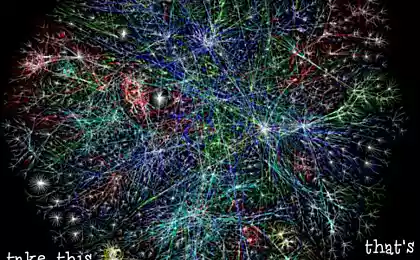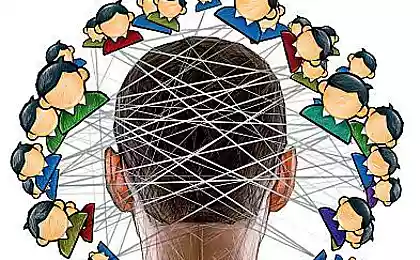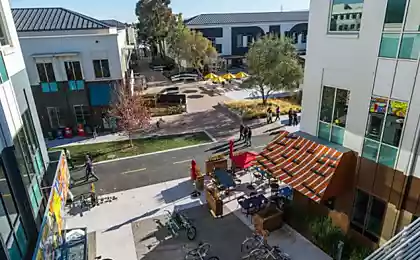799
10 ways that Facebook and other social networks make you smarter
By the time you read this article, nearly 300 000 people in all corners of the world updated their status in favorite social networks. Unbelievable. Even more incredible is the fact that eight million people in the near future, read these statuses. We have reason to believe that you are a 96 percent chance of also using some of the social networks. Well, you are to be congratulated, it makes you smarter. Here's how:
1. More friends - more mozg
So the more friends you have, the smarter you are. In particular, people with lots of friends in the social network, as a rule, have more developed amygdala - areas of the brain responsible for emotional reactions related to memory functions such as remembering names and persons.
In fairness it should be noted that the researchers did not actually sure whether chat with friends on Facebook leads to the development of these regions of the brain, or people with initially large almond-shaped bodies give birth to more social contacts. To be certain of this, researchers need to monitor user groups Facebook for a longer time than they are already doing in order to accurately determine whether the structure of the brain change depending on the number of network friends.
2. Improving pamyati
One of the side effects of a large number of friends is that you have to be aware of all of their cases. In real life, you probably have a few dozen friends, colleagues, classmates, and perhaps half a dozen close friends with whom you often meet. On Facebook the same person may have more than 200 friends - far more than in real life. Researchers believe that by simply tracking the actions of these people over time can greatly increase working memory.
The difference from the previous paragraph that it concerns almost everyone, not just the "thousanders". While your friends list on Facebook more than regular social ties in real life, your brain will have to work harder to successfully process all incoming information.
3. Interaction with other lyudmi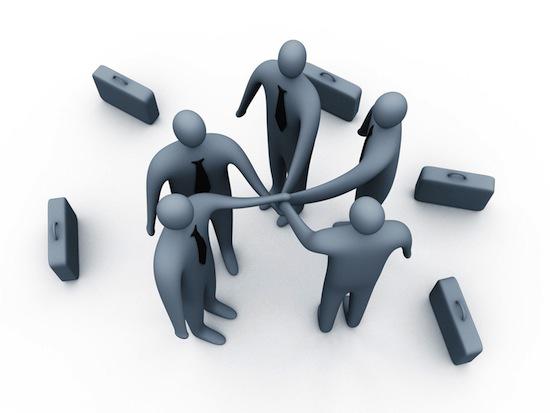
Interaction with others to solve problems - not only human ability, but due to the fact that we do this more often than other animals, this may be one of the reasons why a large relative volume of the brain.
A team of researchers from Trinity College in Dublin simulated neural pathways of the two people who had to decide whether they will work together or individually to solve the task. It turned out that with the cooperation of the brain create new neural pathways, because he had to take account of the second person. The brain has grown and changed in order to create space for a larger number of potential outcomes.
Our brains all the time interacting with the people around us. Of course, not only on Facebook, but social networks are becoming more popular. In the study of the behavior of young people from 30 different countries it found that more than 40% prefer to interact with other people through the Internet.
4. Positive emotsii
On Facebook, you can say a lot of negative things, but being able to stay in touch with friends and family has an extremely positive impact. Positive, even in small quantities contributes to the breadth and clarity of thought. In particular, studies have shown (.pdf), that people after watching a video of positive tests performed better on verbal and visual associations.
In another experiment, doctors were asked to look at the positive images from movies or pictures, and then were asked to diagnose liver disease. Those who did the work in a good mood, diagnosed faster.
5. Lovely zhivotnye
As Facebook and other social networks are extremely a lot of photos nice little kittens and puppies, and users from time to time send each other these charming pictures. And it also brings a positive effect, because the images of cute animals helps you to concentrate and perform more effectively.
In this area, as the experiment was conducted. One part of the test was to find a specific figure in a long numerical sequence, and the other playing the logical computer game. Some of these people are shown pictures with young kittens, others - pictures of adult animals, and the third - the image of food.
The effectiveness of those who saw the pictures of kittens, was 44% higher.
6. Written navyki
It is believed that humanity with each generation becoming more stupid. Language strap falls all stronger because of short messages on Twitter and SMS. But this is not the case - our generation writes more and better than the previous ones - thanks to social networks.
Young people, who often write in Facebook, spelling is often better. In addition, they more clearly articulate their thoughts. The fact that these people are used to adjust your style of writing under certain situations - see, Facebook messages, emails and school essays are some differences in the style of presentation, even if he wrote them one and the same person. This effect is similar to how people in the conversation switch from one language to another - for example, from Russian to English.
7. Chtenie
First of all, Facebook - is a text website. It may seem that most reports nothing of value, but the fact that you read them to affect your brain a thousand different ways. In a recent study, participants were asked to read a book, and this time had a magnetic resonance imaging (MRI). Some participants in the reading had to analyze complex information, while others read just for fun.
The difference in the styles plain text causes the blood flow to different areas of the brain, triggering a variety of mental functions. A variety of messages in Facebook makes our brains use different areas. In other words, reading recipe pizza and reading political news activates different lobes of the brain. And because of this there is another interesting effect: Skill selective reading. When you view the newsfeeds brain snatches of text words and phrases, sorting them, and finally focuses on the most interesting information.
8. Ability rassuzhdat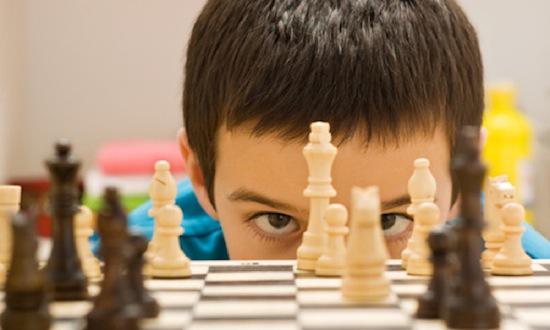
In fact, the main goal of social networks in particular and the Internet in general - to help you start the discussion with whom you want and when you want it. The brain enjoys it. It is believed that the process of dispute - one of the foundations of the human intellect. And the psychological process of search arguments - a great workout for the brain.
One of the ideas of the theory of argumentation is that the dispute makes you think abstractly in order to maintain a logical, compelling dialogue. You do not just use your memory to remember the right words - you check how these words are relevant in this context.
In real life, everything is often reduced to the argument "yes, you're a fool" and "fool itself", the dispute is over the internet gives you more time to think, to choose the best arguments, and thus develops the skills of reasoning and critical thinking.
9. The crystallized intellekt
Cultural intelligence, political intelligence, social intelligence - none of this has anything to do with how to really work your brain. But together they form an understanding of the world as a whole, something known as "crystallized intelligence».
People there are two types of intelligence: movable and crystallized. The mobile is able to solve problems using logic. Crystallized intelligence - is the collection of all your knowledge of vocabulary, knowledge of history and current events, and so on.
Remember where you take most of the information? Most likely, from social networks. Even if you are not registered with them, then you recognize the new still from different sites. Some knowledge of your brain takes in processing immediately, while others postponed. Of course, the Internet - is not the only source of knowledge about the world, but information from various areas in Facebook is constantly updated, and keep track of them so very convenient.
10. Critical myshlenie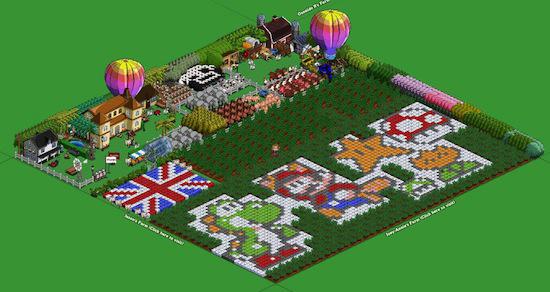
It is thought that video games - a foolish pastime. No employer will not take you to work for a highly rated in any game, because for adults for some reason they are considered taboo. But playing them almost everything, because no other way to explain the thousands of visits of games on Facebook is simply no.
But it can benefit your brain. Puzzles, for example, are taught to solve problems creatively - you are looking for a custom scenario, and taking place at this time in the brain chemical processes to help you learn how to think critically.
via factroom.ru
1. More friends - more mozg

So the more friends you have, the smarter you are. In particular, people with lots of friends in the social network, as a rule, have more developed amygdala - areas of the brain responsible for emotional reactions related to memory functions such as remembering names and persons.
In fairness it should be noted that the researchers did not actually sure whether chat with friends on Facebook leads to the development of these regions of the brain, or people with initially large almond-shaped bodies give birth to more social contacts. To be certain of this, researchers need to monitor user groups Facebook for a longer time than they are already doing in order to accurately determine whether the structure of the brain change depending on the number of network friends.
2. Improving pamyati

One of the side effects of a large number of friends is that you have to be aware of all of their cases. In real life, you probably have a few dozen friends, colleagues, classmates, and perhaps half a dozen close friends with whom you often meet. On Facebook the same person may have more than 200 friends - far more than in real life. Researchers believe that by simply tracking the actions of these people over time can greatly increase working memory.
The difference from the previous paragraph that it concerns almost everyone, not just the "thousanders". While your friends list on Facebook more than regular social ties in real life, your brain will have to work harder to successfully process all incoming information.
3. Interaction with other lyudmi

Interaction with others to solve problems - not only human ability, but due to the fact that we do this more often than other animals, this may be one of the reasons why a large relative volume of the brain.
A team of researchers from Trinity College in Dublin simulated neural pathways of the two people who had to decide whether they will work together or individually to solve the task. It turned out that with the cooperation of the brain create new neural pathways, because he had to take account of the second person. The brain has grown and changed in order to create space for a larger number of potential outcomes.
Our brains all the time interacting with the people around us. Of course, not only on Facebook, but social networks are becoming more popular. In the study of the behavior of young people from 30 different countries it found that more than 40% prefer to interact with other people through the Internet.
4. Positive emotsii

On Facebook, you can say a lot of negative things, but being able to stay in touch with friends and family has an extremely positive impact. Positive, even in small quantities contributes to the breadth and clarity of thought. In particular, studies have shown (.pdf), that people after watching a video of positive tests performed better on verbal and visual associations.
In another experiment, doctors were asked to look at the positive images from movies or pictures, and then were asked to diagnose liver disease. Those who did the work in a good mood, diagnosed faster.
5. Lovely zhivotnye

As Facebook and other social networks are extremely a lot of photos nice little kittens and puppies, and users from time to time send each other these charming pictures. And it also brings a positive effect, because the images of cute animals helps you to concentrate and perform more effectively.
In this area, as the experiment was conducted. One part of the test was to find a specific figure in a long numerical sequence, and the other playing the logical computer game. Some of these people are shown pictures with young kittens, others - pictures of adult animals, and the third - the image of food.
The effectiveness of those who saw the pictures of kittens, was 44% higher.
6. Written navyki

It is believed that humanity with each generation becoming more stupid. Language strap falls all stronger because of short messages on Twitter and SMS. But this is not the case - our generation writes more and better than the previous ones - thanks to social networks.
Young people, who often write in Facebook, spelling is often better. In addition, they more clearly articulate their thoughts. The fact that these people are used to adjust your style of writing under certain situations - see, Facebook messages, emails and school essays are some differences in the style of presentation, even if he wrote them one and the same person. This effect is similar to how people in the conversation switch from one language to another - for example, from Russian to English.
7. Chtenie

First of all, Facebook - is a text website. It may seem that most reports nothing of value, but the fact that you read them to affect your brain a thousand different ways. In a recent study, participants were asked to read a book, and this time had a magnetic resonance imaging (MRI). Some participants in the reading had to analyze complex information, while others read just for fun.
The difference in the styles plain text causes the blood flow to different areas of the brain, triggering a variety of mental functions. A variety of messages in Facebook makes our brains use different areas. In other words, reading recipe pizza and reading political news activates different lobes of the brain. And because of this there is another interesting effect: Skill selective reading. When you view the newsfeeds brain snatches of text words and phrases, sorting them, and finally focuses on the most interesting information.
8. Ability rassuzhdat

In fact, the main goal of social networks in particular and the Internet in general - to help you start the discussion with whom you want and when you want it. The brain enjoys it. It is believed that the process of dispute - one of the foundations of the human intellect. And the psychological process of search arguments - a great workout for the brain.
One of the ideas of the theory of argumentation is that the dispute makes you think abstractly in order to maintain a logical, compelling dialogue. You do not just use your memory to remember the right words - you check how these words are relevant in this context.
In real life, everything is often reduced to the argument "yes, you're a fool" and "fool itself", the dispute is over the internet gives you more time to think, to choose the best arguments, and thus develops the skills of reasoning and critical thinking.
9. The crystallized intellekt

Cultural intelligence, political intelligence, social intelligence - none of this has anything to do with how to really work your brain. But together they form an understanding of the world as a whole, something known as "crystallized intelligence».
People there are two types of intelligence: movable and crystallized. The mobile is able to solve problems using logic. Crystallized intelligence - is the collection of all your knowledge of vocabulary, knowledge of history and current events, and so on.
Remember where you take most of the information? Most likely, from social networks. Even if you are not registered with them, then you recognize the new still from different sites. Some knowledge of your brain takes in processing immediately, while others postponed. Of course, the Internet - is not the only source of knowledge about the world, but information from various areas in Facebook is constantly updated, and keep track of them so very convenient.
10. Critical myshlenie

It is thought that video games - a foolish pastime. No employer will not take you to work for a highly rated in any game, because for adults for some reason they are considered taboo. But playing them almost everything, because no other way to explain the thousands of visits of games on Facebook is simply no.
But it can benefit your brain. Puzzles, for example, are taught to solve problems creatively - you are looking for a custom scenario, and taking place at this time in the brain chemical processes to help you learn how to think critically.
via factroom.ru
Cockroaches are very scrupulous in relation to personal care
Elephants do not want to have anything to do with people


